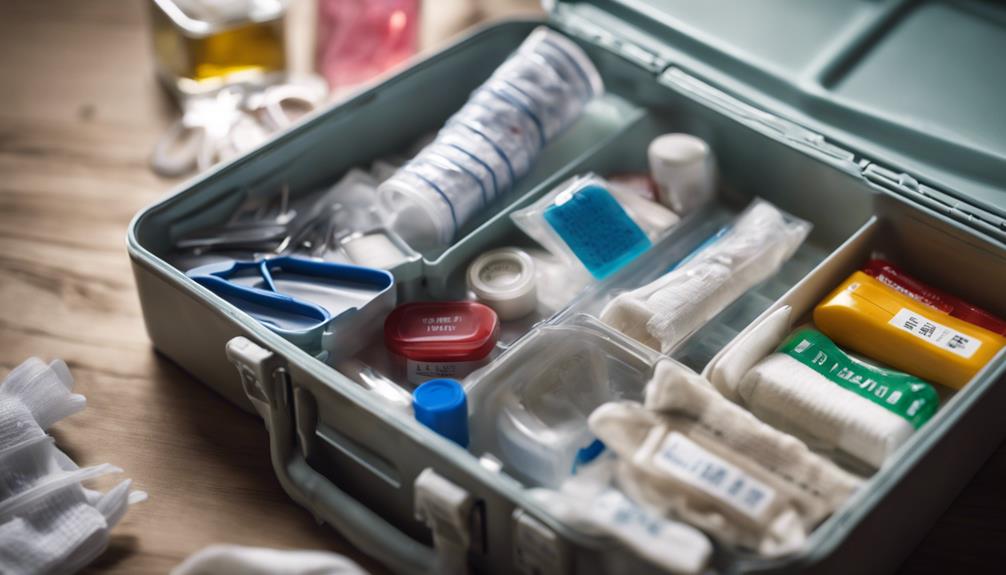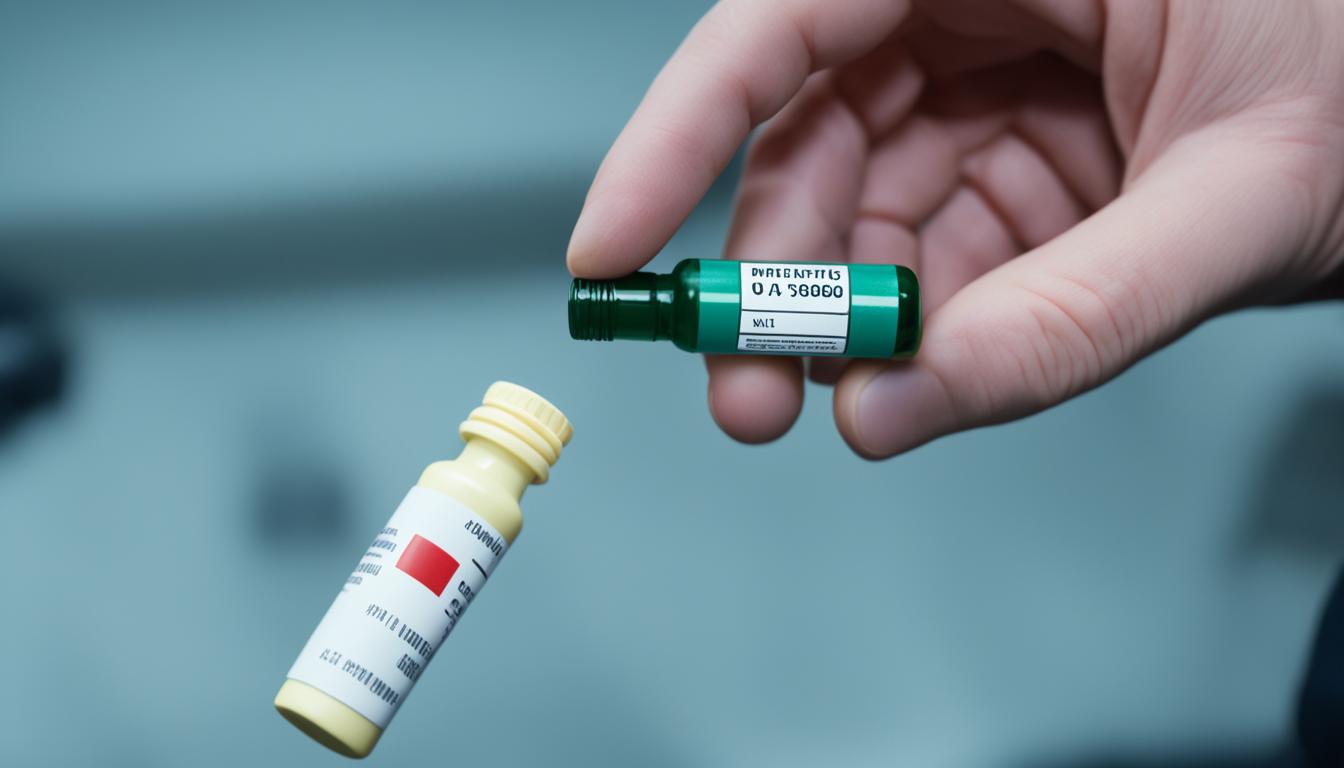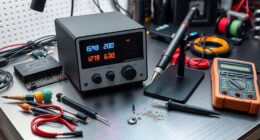When prepping your medical kit, make sure to stock up on antibiotics, antiseptic wipes, pain relievers, bandages, allergy meds, and tools like a thermometer and tweezers. These items are essential for managing health emergencies effectively. Make certain you have a complete selection of essentials to handle unforeseen situations with confidence.
Key Takeaways
- Include broad-spectrum antibiotics like Amoxicillin Clavulanate and Ciprofloxacin.
- Antiseptic wipes prevent infections and maintain hygiene in emergency situations.
- Keep acetaminophen and ibuprofen for versatile pain relief in your kit.
- Stock various bandages and gauze types for wound care needs.
- Add allergy medication and anti-diarrheal options for comprehensive medical supplies.
Antibiotics Selection Guide
For choosing the right antibiotics for your emergency kit, opt for broad-spectrum options such as Amoxicillin Clavulanate, Ciprofloxacin, or Doxycycline.
When considering antibiotics for your medical kit in Disaster Preparedness scenarios, it's important to have versatile coverage against a range of potential infections. Consulting healthcare professionals can provide valuable guidance on antibiotic selection tailored to your individual needs and medical history. Allergies and sensitivities should be taken into account when making your choices to guarantee the safety and effectiveness of the antibiotics in your kit.
To create a detailed antibiotics selection guide, prioritize antibiotics that can address various health conditions effectively. Proper storage of antibiotics is essential to maintain their efficacy for when they're needed most.
Antiseptic Wipes and Their Uses

Antiseptic wipes play an essential role in maintaining hygiene and preventing infections by cleaning wounds effectively. These pre-moistened pads contain antiseptic solutions such as alcohol or benzalkonium chloride, making them convenient for on-the-go wound care. They eliminate the need for soap and water when tending to minor cuts, scrapes, and insect bites.
Individually wrapped for single-use application, antiseptic wipes guarantee cleanliness and reduce the risk of contamination. Gentle on the skin, these wipes help prevent the spread of harmful bacteria, making them indispensable in first aid kits and emergency preparedness supplies. Using antiseptic wipes before applying bandages or ointments can promote proper wound healing and reduce the chances of complications.
When it comes to Medical Supplies, antiseptic wipes are a simple yet crucial tool for keeping wounds clean and aiding in the prevention of infections.
Pain Relievers Overview

When preparing for emergencies, understanding the role of pain relievers in managing common ailments is crucial to your medical preparedness. Pain relievers like acetaminophen and ibuprofen are essential components of any medical kit, providing relief for headaches, muscle aches, and fevers when medical care is unavailable. Including a variety of pain relievers guarantees you can address different types of pain effectively. Remember to follow proper dosing instructions to maximize the benefits of these medications.
| Pain Relievers | Common Uses |
|---|---|
| Acetaminophen | Headaches, fevers |
| Ibuprofen | Muscle aches, inflammation |
| Aspirin | Pain relief, anti-inflammatory properties |
Pain relievers are versatile emergency supplies that can offer relief for a range of minor to moderate pain issues. Having these medications on hand can help you manage discomfort effectively during unforeseen situations.
Bandages and Gauze Types

When preparing your medical supplies, keep in mind the types of bandages and gauze you may need. Understanding bandage selection tips, gauze for wound care, and the benefits of adhesive bandages can help you be better prepared for any injuries that may occur.
Make sure to stock up on a variety of bandage types to handle different wound sizes and situations effectively.
Bandage Selection Tips
Consider selecting the appropriate bandages and gauze types based on the size and type of wound for effective treatment and protection. For minor cuts and scrapes, adhesive bandages come in various sizes suitable for different wounds. They provide a quick and easy way to cover and protect these small injuries.
Non-adhesive gauze pads are more suitable for larger wounds that require absorption and protection, as they can be taped down securely. Sterile gauze rolls are perfect for holding dressings in place and applying compression when needed.
Self-adherent wrap bandages are versatile and simple to use for securing dressings or splints without the need for tape. Transparent film dressings are excellent for protecting minor wounds while allowing you to monitor the healing process visually.
Including a variety of these bandages and gauze types in your first aid kit will make sure you're prepared for a range of injuries and situations.
Gauze for Wound Care
Choosing the right types of gauze is essential for effective wound care and protection in emergency situations. Gauze is a critical component of medical care, as it serves multiple purposes in treating injuries.
When assembling your medical kit, consider including various types of gauze such as sterile, non-sterile, and antiseptic-impregnated. Sterile gauze is important for preventing infections, while non-adherent gauze is gentle on delicate wounds. Gauze pads are suitable for managing moderate to heavy bleeding, and rolled gauze is excellent for securing dressings and providing compression for larger wounds.
Having a variety of gauze types ensures you're prepared for different wound care needs that may arise. Remember, practical steps like proper wound cleaning and applying the correct gauze type can make a significant difference in promoting healing and preventing complications during emergencies.
Be sure to stock up on a selection of gauze to support your first aid efforts.
Choosing Adhesive Bandages
Why are adhesive bandages and gauze types important components of your medical kit for wound care?
Adhesive bandages play a vital role in providing immediate protection to minor cuts and wounds, preventing infections and promoting healing. Having a variety of adhesive bandages in your supplies on hand guarantees you can choose the right type for the specific needs of the injury.
Gauze bandages, on the other hand, offer versatility in wound care, as they can be used to secure dressings, provide additional absorption for larger wounds, and create pressure dressings.
When selecting adhesive bandages, consider factors like the material (fabric, plastic, or waterproof), size, and shape to ensure proper coverage and protection. Similarly, gauze bandages come in rolls or pads, allowing you to address different wound sizes effectively.
Allergy and Anti-Diarrheal Medication

You need to make sure you have allergy medication like antihistamines in your prepper kit for quick relief from allergic reactions.
Additionally, having anti-diarrheal medication on hand is essential to manage symptoms and prevent dehydration during emergencies.
Stocking up on these medications can help you stay healthy and comfortable in challenging situations.
Allergy Relief Options
Allergy relief options for preppers commonly include antihistamines like diphenhydramine to combat allergic reactions in emergency situations. Antihistamines can provide relief from allergic symptoms such as itching, sneezing, and hives, making them essential in your prepper medical kit. Here is a table showcasing some popular allergy and anti-diarrheal medications for your reference:
| Medication | Purpose | Dosage |
|---|---|---|
| Diphenhydramine | Relieves allergic reactions | Follow label instructions |
| Loratadine | Alleviates allergy symptoms | Follow label instructions |
| Cetirizine | Helps with allergic reactions | Follow label instructions |
| Fexofenadine | Treats hay fever symptoms | Follow label instructions |
| Epinephrine | Emergency allergic reactions | Administer as directed |
Including these medications in your prepper kit can make certain you are prepared to manage allergic reactions effectively during emergencies.
Diarrhea Treatment Essentials
Incorporate loperamide and diphenhydramine for effective management of diarrhea and related allergic reactions in your prepper medical supplies. By including these essential medications, you can guarantee thorough care and relief during emergency situations.
Here are some important points to take into account when preparing your kit:
- Control Diarrhea: Loperamide helps manage symptoms and prevent dehydration.
- Alleviate Allergies: Diphenhydramine can provide relief from allergic reactions often accompanying diarrhea.
- Complete Medical Care: Addressing both diarrhea and allergies in your kit is essential for well-being.
- Emergency Relief: Having these medications on hand offers treatment options when unexpected situations arise.
- Taking Care: Properly managing diarrhea and allergies can greatly improve comfort and overall medical care in emergencies while being mindful of potential side effects.
Tools: Thermometer and Tweezers

Two essential tools to have in your medical kit are a reliable thermometer for monitoring body temperature and tweezers for safely removing foreign objects from wounds. A medical thermometer is essential for keeping track of body temperature, as changes can indicate underlying health issues. In cases of infection or illness, monitoring temperature variations is important for timely medical care.
Similarly, tweezers play a significant role in wound care by allowing you to remove splinters, ticks, and other debris safely. Having tweezers in your kit ensures that you can address skin injuries promptly, reducing the risk of infection and promoting proper healing. Fine-tipped tweezers are especially useful for precise and hygienic removal, minimizing complications.
Frequently Asked Questions
What Medicine Is Good for Bug Out Bags?
For bug out bags, include antibiotics like Amoxicillin Clavulanate, Ciprofloxacin, and Doxycycline to combat infections. Antiseptic wipes, pain relievers, and topical ointment address various needs. Gauze, bandages, thermometer, tweezers, and a quick guide guarantee readiness.
What Should Be an Essential Item in Your Survival Kit?
You think a survival kit needs fancy gadgets, but really, broad-spectrum antibiotics are key. Don't forget basics like wipes, pain relievers, and bandages. Add in gloves, tourniquets, and meds organizer for preparedness.
What Should I Have in a Personal Survival Kit?
You should have essential medical supplies like bandages, antiseptic wipes, and pain relievers in your personal survival kit. Consider adding gauze, antibiotic cream, and painkillers for basic care. Antihistamines, tourniquets, splints, and burn cream are vital additions.
What Are 10 Medicines in a First Aid Kit?
When preparing a first aid kit, make sure you have essential medicines like pain relievers, antihistamines, hydrocortisone cream, antacids, and antibiotic ointment. These items can provide relief for common ailments and help prevent infections in minor wounds.
Conclusion
As you gather your medicine for your prepper kit, remember that just as each tool serves a specific purpose, each item in your kit serves to protect and preserve.
Like a skilled craftsman carefully selecting the right tool for the job, you're crafting a safety net for yourself and your loved ones.
With the right medicines at your disposal, you're equipped to weather any storm that may come your way.










